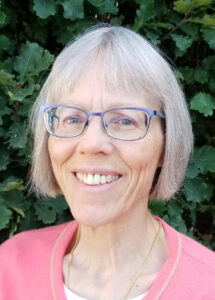By Barb Arland-Fye
An early start to the chiropractor’s office went awry when I missed the interstate exit and had to travel about 10 miles to the next one. The gravel paths in the median strip along the way looked tempting, but the bold print “No U-turn” signs kept me honest. The error meant I would be late, not early, to my appointment.

I pulled off onto the road’s shoulder and called the chiropractor’s office about my delay. Gigi said, “No problem. We’ll see you when you get here. Drive safe.” Her reassuring attitude felt like an act of mercy. I arrived at the office about 10 minutes late.
Generally, patience is not a virtue I master in a waiting room but gratitude made patience possible that night. I received an adjustment of attitude along with an adjustment of my spine. Driving away from the chiropractor’s office, I wondered why, having set off early, I ended up being late for my appointment.
The answer eluded me as I drove to my next stop, the home of a parishioner I had not visited before, to drop off something. Ann lives near the top of a winding hill in a neighborhood of multiple winding hills and I climbed the wrong one! Eventually, I arrived at Ann’s house. She flagged me down in her driveway because I couldn’t read the address number on the mailbox in the dark.
Although flustered by my second delay in two hours, I relaxed immediately in the warm atmosphere of Ann’s presence. I see her at Mass regularly, but didn’t really know Ann and wanted to get to know her. Our conversation in her kitchen was a first and enjoyable step. Since childhood, hearing the stories of people’s lives has fascinated me. Taking time to read or listen to their stories is essential to gaining a better understanding of the world in which we live.
I left Ann’s house thinking about a quote from a story I wrote about Bishop Thomas Zinkula’s journey to Africa: “You Westerners own the clock. Africans own the time.” Appointments, deadlines and wake-up alarms dictate the lives of Westerners, including me. We own the clock — or maybe it owns us. We have hardwired our lives to a rigid understanding of time in a society that operates on a 24-7 schedule, which leaves little “time” for contemplation. I wonder if that craving for contemplation is among the reasons so many young adult Catholics are drawn to eucharistic adoration.
Years ago, Deacon Frank Agnoli wrote a column for The Catholic Messenger about the introductory rites of the Mass that provided insight for me about the concept of time. He wrote, “We step outside of normal time (what the Greeks called chronos, or clock-time) into timeless time, opportune time, the fullness of time (in Greek, kairos). If someone asks, ‘Do you have the time?’ you might answer: ‘It’s 3 o’clock’ (chronos). Or you might say: ‘Sure, what do you need?’ (kairos). Perhaps we ought to take our watches off when we come to Mass, a reminder that we’ve moved from chronos into kairos; from clock-time measured in minutes into available time measured in moments; from our usual world to the liminal (in-between) world of liturgy, a world that straddles heaven and earth.”
Deacon Agnoli’s eloquent explanation of time applies to our lives in and outside of liturgy. Time is a precious commodity that we can’t hold on to; it vanishes like a sigh. We need to straddle that space between owning the clock and owning the time. My unexpected delays the other night were chronos and kairos moments because they helped me to appreciate my relationships with others.
(Contact Editor Barb Arland-Fye at arland-fye@davenportdiocese.org)











